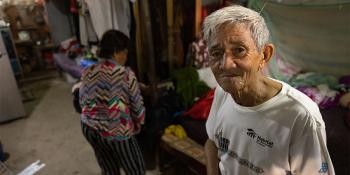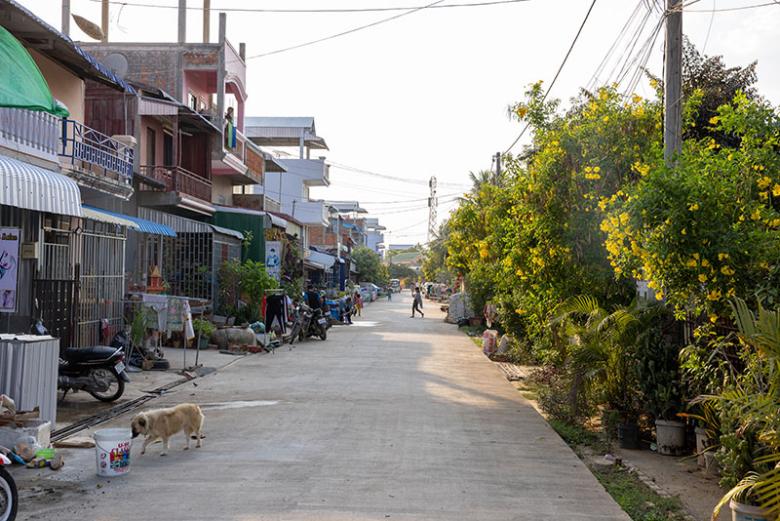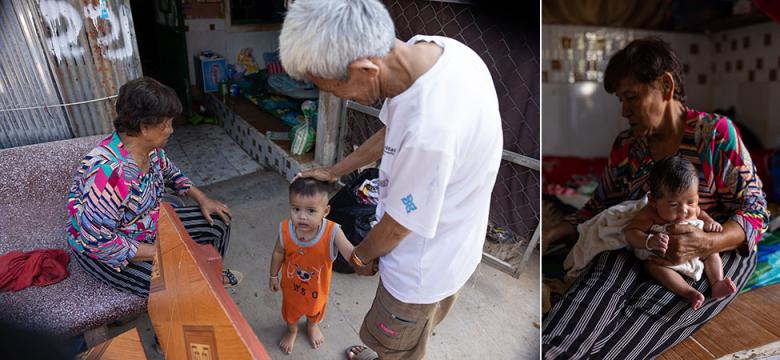
Lifetime achievement
This story is part of a series marking Habitat for Humanity’s 40 years of building homes and building solutions in Asia and the Pacific.
BATTAMBANG, Cambodia (October 2023) — After a decade of fighting for secure tenure for his community, Sreang is satisfied with the outcome. “My big achievement is the success of getting the land certificate, I own the land. I am happy to get the land and build a house,” said Sreang, 74, a community leader who lives in Battambang, one of Cambodia’s most populous provinces. According to an ESCAP report, rapid migration and urbanization has resulted in the formation of more than 60 informal settlements in Battambang city. Like Sreang, many informal settlement residents live along roads, or riverbanks, railway tracks and private land.
Since 1985, Sreang’s family and more than 60 other families have been living on a public road in Battambang city in northwest Cambodia. These families are under constant threat of forced eviction and often live in precarious conditions. Their lack of land titles deters the government from authorizing any upgrades to the informal settlements such as access to water, drainage, road, waste management and other housing conditions.
Led by Sreang as head of the residents’ committee, the Ponler Prek Preah Sdach informal settlement community took 10 years to reach an agreement with the local government to be allocated land. It involved long hours of numerous meetings and discussions between the residents’ committee and community members, and the committee with government representatives.

It took a decade before Sreang and other families in his community, who live along a public road in Cambodia’s Battambang city, could be allocated land. Photos: Habitat for Humanity International/Raymond McCrea Jones.
Unanimously, 55 of the families agreed to move to one side of the road. In return, each family received a 32-square-meter plot of land from the Battambang provincial government in 2015. Some families were living on more land before the allotment, others on less land. Those with more land were willing to share their land to receive their land certificates that provided security of tenure and protection against forced eviction. The project requires Sreang and other community residents to live 10 years on the allocated plots of land before the Battambang provincial government will grant land titles to the families.
With his land certificate as a proof of secure tenure, Sreang was able to get a loan of up to US$10,000 from Habitat’s microfinance institution partner, KREDIT and CBIRD. The money was used to buy a small truck which Sreang’s son-in-law refurbished to become a mobile ice cream store.
The following year in 2017, the families partnered with Habitat for Humanity Cambodia to construct their homes together with more than 250 volunteers in a weeklong build. “I remember the volunteers who came to help me build, I still have a photo of them in front of my new house,” Sreang shared. His eyes welled up when he described the dilapidated condition of his old house. In the rainy season, it would be flooded due to the lack of a proper drainage system. Sometime dangerous insects and venomous snakes would come into the house.
Habitat also supported Sreang and other community members to get access to basic services such as water and electricity. Community Empowerment and Development, a local nongovernmental organization that partnered with Habitat Cambodia, trained the community to build proper drainage systems.

Sreang (center) and his wife Vanna looking after their grandchildren.
Without having to relocate, the residents could build adequate housing on land that will belong to them. Residents in the community could continue working close to the city as cooks, barbers, drivers, welders and carpenters. Their children go to a school nearby. The families can buy fresh food from a local market and go to a local hospital for medical services.
Currently, Sreang lives with his family of 12 in Battambang city. He and his wife Vanna, 71, are taking care of their grandchildren whose parents have gone to Thailand for work. The COVID-19 pandemic had taken a toll with some of his children losing their jobs. His sons who are working abroad send him money for living expenses.
This community is one of four existing communities of Sangkat Prek Preah Sdach, where Habitat works to build awareness on land rights; provide land tenure security; strengthen partnership in social land concession; and provide housing solutions and support services.
Sreang continues to be active as the community leader. “My committee worked closely together, cooperating, not finding fault of putting blame on others when things go wrong, we find ways to bring people together.” He helps to maintain unity in the community by mediating between neighbors who may have conflicts over division of land, sharing of resources, relationships and financial matters.
In 2025, Sreang and his neighbors will finally receive land titles that give them and the future generations secure tenure. “My neighbors are grateful to me, I’m very grateful to them, we supported each other to get the land,” he said. Sreang shared that he has asked his children not to sell the house and land after his passing.